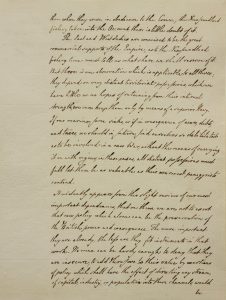RA GEO/ADD32/2010: page 3
George III is remembered by many as the King who lost the American colonies, and his reputation on both sides of the Atlantic has suffered accordingly. The causes of the American War of Independence, however, are complex, and include the decision made by the British Government in 1763 that the territories in North America recently acquired from the French should be settled and organised for defence and profit, and that, as this would be expensive, America should pay for its own government by being taxed heavily. The Americans, not unsurprisingly, felt that there should ‘no taxation without representation’. Anti-British feeling grew and war finally broke out in 1775. On 4 July 1776 the Continental Congress issued the Declaration of Independence. The conflict was protracted, but in 1781, with the assistance of France, Spain and the Netherlands, the Americans won the land war, compelling the British Army to surrender at Yorktown. In 1783 the Treaty of Paris ended the war and recognised the sovereignty of the United States. At the time many people felt that this defeat was a disaster for Britain. However, the King himself took a much more sanguine approach to the defeat, as can be seen in this essay.

